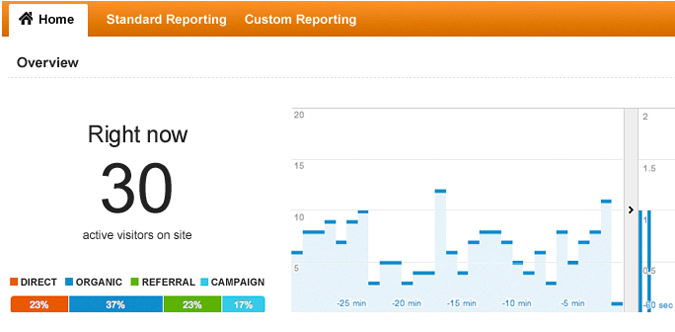If you write for both a personal and a business blog you need to tailor your approach to suit a different audience or you'll risk losing readers.
If you find yourself writing about your cat's almost human-like facial expressions on your tech business blog more often than you find yourself writing about Apple or Facebook, you ought to read on.

Blogging is an important part of a broader SEO strategy which is why Blogging and Content Marketing Training is included as one of our SEO Training Courses.
These are the main differences between the two styles of blogging and why they are important to remember. Of course there are always exceptions to the rule. If your tech blog readers like cats then you might be on to a winner.
Aaron Charlie
16 Nov 2012
BrightonSEO usually ends with a 'Lightning Talks' session but this year Kelvin switched up the format and introduced a 'Greatest Tips Session'.
The idea: every speaker from the day shares their top actionable SEO tip that attendees can start using when back in the office on Monday morning. We particularly liked the idea because it meant a chance to catch tips from speakers which we'd missed on the day.
We came away with 21 fantastic tips which we couldn't help but share with those who couldn't make it on Friday.
You can watch the full video, skim through the quick tips, or read the full transcript with our thoughts below.
If you are interested in developing your SEO skills then take a look at our Beginners SEO and Advanced SEO Strategy courses. Both courses are developed to quickly improve your practical skills and increase your search knowledge.
Aaron Charlie
16 Sep 2014
We always look forward to the panel debates at BrightonSEO as the discussion is more open. It's even better when they involve ex-members of the Google Search Quality team (and a "former" spammer).
Moderated by theMediaFlow's Nichola Stott, this year's panel included Fili Wiese and Kaspar Szymanski, both ex-Google turned SEO Consultant, and Gareth Hoyle, representing LinkRisk.
Watch the full panel debate
Key Takeaways
- You cannot recover from a penalty with just a disavow file, you have to do link removal
- Google is using the disavow tool to crowdsource bad links/domains
- A bad link is any link "made for SEO"
- Link building is fine, as long as you build for traffic
- Google can tell if a link is getting clicked or not
- Negative SEO is far less common that it is talked about, it is usually a spam attack or result of miscommunication
- Sites hit by negative SEO are never clean to start with
- There are hundreds of reasons that your site might drop in Google, not always a penalty, so do discovery on your own site, don't look for answers on the internet
- Google focus on users, not SEOs/webmasters, so there is always going to be collateral damage
- You can't recover from a penalty and then delete your disavow file, Google keeps track of everything and will find out
- Second penalties are much harder to recover from that first ones
![]()
Craig Charley
25 Apr 2014
There's no denying the utility and effectiveness of Google Analytics as a means to better understanding the way users interact with your website. Among all the features that GA has though, Real-Time Reports are often a bone of contention; it's a matter of dispute as to exactly how useful they are.
I decided to ask some experts for their views on the matter to try and get some answers.
On our Google Analytics Course you'll learn exactly how to make the most of its impressive features to maximise your online efforts, including Real-Time reports.

So let's take a look at what the experts say:
Great for Testing
A key theme that seemed to crop up regularly was how many found real-time reports useful for testing technical aspects of a campaign, whether that's for code, tracking or links.
@AaronCharlie Great for testing code, 'walking the shop floor', and getting non-experts interested in analytics. Underrated reports.
— dan barker (@danbarker) July 26, 2013
very useful for checking new tracking (e.g. events, goals, etc.). Also for testing emails to make sure all tagged links work — Dara Fitzgerald (@darafitzgerald) July 26, 2013
Aaron Charlie
2 Aug 2013
On Sunday 14th October, Felix Baumgartner jumped out of a balloon 24 miles above the planet, breaking the speed of sound and a few world records to boot. It was an impressive feat, pushing the human body to new limits and showing what people are capable of achieving.
Watch the jump!
Not loading? Click here to watch on YouTube.
Red Bull Stratos was a collaborative event, with the previous record holder for sky diving - 84 year old Joe Kittinger - guiding Felix from the ground, a whole team supporting and organising the jump, and just a bit of help from the sponsor Red Bull. It was also what I believe to be the first truly global social media event. Read on to find out what I mean by that...

If you want to find out more about the jump itself, head to the Red Bull Stratos website or the BBC where it's proving quite a popular subject today, claiming 4 out the top 5 most shared stories:

Want to publicise events like Red Bull? We offer tailored social media training packages. Combine our social media, content marketing and WordPress courses to learn how to build a website and create and marketing content using social media.
Craig Charley
15 Oct 2012
|
Today we're at the 2nd BrightonSEO of 2012, blogging on all the topics that interest us! First up we had a great talk from Dave Trott, but not before an opening video from Professor Puppet followed by a dancing Panda and Penguin (Kelvin was the penguin). Here's a picture of Kelvin - Post Penguin. I'll admit that we were dreading the day being about link building, keywords and lots of boring SEO stuff that doesn't really mean anything anymore. Instead, Dave Trott of CSTTG set the tone for the morning sessions - SEOs need to start learning from marketers and from other disciplines. Stop the silos, stop the SEO church (term used by Anthony Mayfield in the second talk) and start thinking about consumers, brand, business and taking tips from marketing tactics that have worked long before search engines existed. |
Funnily enough, Dave only learned what SEO was 5 minutes before he was due to speak, thinking it was the name of an organisation! But as he said, SEO is about beating your competitors, just like any other business.
“Whatever you do, you need to stand out."
The focus of Dave Trott's talk was how to separate ourselves from our competitors so you stand out from the crowd and don't get ignored.
Creativity
Creativity is the new buzzword – from creative thinking to creative football managers. But does anybody know what it actually means?

Dave Trott - BrightonSEO
Pure creativity and applied creativity are different. Pure creativity is what you find in art galleries: it doesn't do anything, but takes you forward in your thinking.
Then along come designers/ media who take that pure creativity and turn it into applied creativity. This is the wrong way round, and marketers should instead adopt the Bauhaus method of form over function.
90% of Marketing is Ignored
Apparently, 18 billion was spent on marketing last year but 90% wasn’t noticed, the same goes for SEO. So how do you get noticed?

Craig Charley
14 Sep 2012
Karen Gillan Underwear Example
How to identify Trending Topics for SEO
Writing or blogging about trending topics can be a great way to generate traffic (and links) to your site, provided that your content is high quality and that you pick the right keywords to optimise on.
The second half of that equation can be the difference between loads of traffic and very little, so identifying what people want to read about (and more importantly, exactly what they are typing in to Google right now) is paramount. If you can be among the first to blog on a trending topic you can get your site on the front page of Google quickly, and bag the traffic (what's more if you're the first, you're more likely to stay on the front page longer).
If you need to learn more about blogging and SEO, we run regular Blogging Training, Search Engine Optimisation Course, Social Media Training and Google Analytics courses in Brighton, Sussex.

So - "how can I find trending topics?" At Friday's BrightonSEO conference Malcolm Colesgave a very informative (and highly entertaining) presentation about how he used a variety of tools to discover trending topics when working on the celebrity news site HolyMoly, including some very interesting data on the searching habits of the Great British male!
Here are our video highlights from his presentation, along with a summary of the tools discussed (more information can also be found on Malcolm's site here)....
News Search Tools: How to Find Trending Topics
We've split the video of Malcolm's presentation in to two parts - the first summarises the News Search Tools used to identify Trending Topics. The second, which I couldn't resist adding, is an example of how HolyMoly used these tools to exploit the search term 'Karen Gillan Underwear', which reveals some interesting (and very amusing) trends in men's searching patterns after they've watched Doctor Who!
#BrightonSEO Video: News Search Tools Summary
A summary of the News Search Tools mentioned is provided below, but do watch the video as Malcolm puts them nicely in to context with examples...
News Search Tools Summary:
Which of these tools you use will depend largely on the sort of content you publish...
--READ MORE--
AOL homepage(look for the green hot searches box) - This tool is more useful for keyword selection as it provides details of exactly the searches users are submitting
AOL hot search blog (ignore the slow-to-update picture box and look for the topic boxes further down) - Scroll down the hot search blog to find most popular searches by category - e.g. if you often write about gadgets you can see which are currently the most popular.
Google News UK (look for the ‘in the news’ list)
Google News USA (click the categories on the left to see the topics)
Google News provides a good summary of what's in the news that day - if its in the news it means that people have already written about it - you won't be able to compete with the major news channels (unless you are one), but you may be able to find an angle on one of these stories for a long-tail search.
Google Insights - A very useful tool if you're writing about an annual / regular event. You can use Google Insights to see what people searched for last time and optimise for those terms. Remember for annual events to include the year in your title (although this has been over-used for major celebrity events like Big Brother and is no longer useful for these).
Webmaster Tools & Google Analytics - These are useful once you're up and running to help you to make the most of the traffic you're already getting and refine your keyword optimisation. Silicon Beach run regular Google Analytics Training and Advanced Google Analytics Trainingcourses if you want to learn more!
Experian Hitwise Data Centre - always a week behind - top 10 searches in various categories on a weekly basis - good for establishing general trends but less useful on a day to day basis.
Surchur - Auseful tool that aggregates multiple sources together to provide "The dashboard to Right Now"!
Major Newspapers often provide useful indicators of what is most viewed - e.g. Guardian Most Viewed and Telegraph (has a 'most viewed' box on each category page and also 'hot topics' right at the bottom of the page.
The BBC also has a summary of the most popular seaches hour by hour on the site
So - there are some really useful News Search tools out there to help you identify what's trending - but what do you do with this information to ensure you get as much traffic as possible...
#BrightonSEO Video: Using News Search Tools: Example - Karen Gillan's Underwear
Here's Malcolm's highly entertaining summary of how HolyMoly discovered a pattern of men searching for "Karen Gillan Underwear", and what they did to ensure they used this to their benefit to obtain maximum site traffic when the Dr. Who Christmas Special came around.
Aaron Charlie
6 Apr 2011